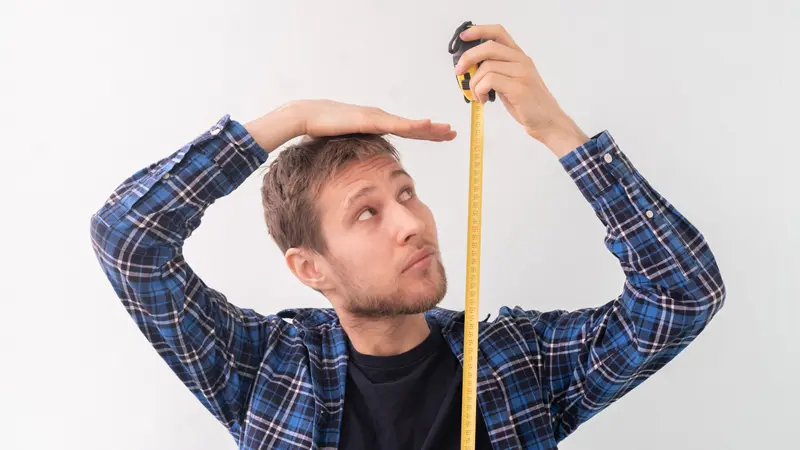- Home
- Growth Hormone
- Growth Hormone
- Growth Hormone Deficiency
- Growth Hormone Therapy
- Growth Hormone Injections
get startedThe Most Effective Hormone Replacement TherapiesDoes Taking HGH Make You Taller? What HGH Does and Does Not Do
Does taking human growth hormone (HGH) injections make you taller? The answer depends on whether you are a child or an adult. HGH injections are designed to treat growth hormone deficiencies in both children and adults.
Once you are fully grown, no amount of HGH is going to make you grow taller. In children, one of the effects of growth hormone is to help children who are not growing normally reach age-appropriate growth milestones. So, in a sense, HGH can make them “grow taller,” but even then, treatment with growth hormone will not make them grow any taller than their maximum genetic potential.
HGH injections are not designed to “make you grow taller.” Growth hormone injections are intended to make up for the HGH that your body is not producing on its own. HGH is made by the pituitary gland. There are a number of genetic conditions that can cause growth hormone deficiency in children. In addition, any disease or injury to the pituitary gland can lead to GHD. In adults, the most common cause of GHD is the steady decline of growth hormone that occurs as we age.
HGH may not make you grow taller, but growth hormone treatments do have remarkable benefits for adults who are suffering from age-related HGH loss.
If HGH Does Not Make You Taller, What Does it Do?
HGH is one of your body’s most important hormones. As you can probably figure out from its name, it is responsible for "growth." That is 100% true. However, HGH is responsible for a lot more than the skeletal growth and all the other changes that allow a child to “grow” into an adult. In fact, even once you are fully grown, HGH continues to play a vital role in:
- Sexual health.
- Your ability to build muscle.
- Metabolism, digestion, and your ability to maintain a healthy weight.
- Strength and energy.
- Sleep.
- Bone health.
- Hair and nail health.
- Cognitive function and emotional states.
However, as vital as HGH is to your welfare, it is an unfortunate fact of life that growth hormone levels decline as you age. This drop in HGH can cause what is known as "adult-onset" or "age-related growth hormone deficiency (GHD).
What Is Growth Hormone Deficiency?
Growth hormone is produced by the pituitary gland, a small gland at the base of your brain in an area known as the hypothalamus.
A growth hormone deficiency (GHD) occurs when, for some reason, your pituitary gland fails to produce enough human growth hormone. Both children and adults can suffer from growth hormone deficiency.
Different Types of HGH Deficiency
While growth hormone deficiency can occur in children or adults, it is more common in children. Growth hormone deficiency in children and adults is related but can be quite different in terms of the symptoms and complications.
This is why doctors refer to two different categories or types of growth hormone deficiency:
- Child-onset GHD, which is present at birth or starts in childhood. It can be carried into adulthood.
- Adult-onset GHD, which develops in adulthood. Adult-onset GHD is sometimes also referred to as “age-related GHD.”
Once diagnosed through proper medical testing, the only genuine, medically approved treatment for GHD – in kids or grownups – is prescription HGH injections.
How to Recognize the Signs and Symptoms of Growth Hormone Deficiency
As mentioned above, there are two types of growth hormone deficiency: one that occurs in kids and one that occurs in adults. Often, adult-onset GHD is simply a childhood GHD that continues into adulthood that went untreated or was treated unsuccessfully.
However, as important as HGH is, even once we become adults, it is an unfortunate biological fact of life that your levels of HGH start to decline fairly steadily after you hit your twenties. It is this drop in HGH levels that occurs as men and women age that is usually responsible for GHD in adults and why it is so important to recognize the signs and symptoms of GHD in adults.
The signs and symptoms of age-related growth hormone loss include:
- Fatigue and a lack of energy.
- Sexual health issues such as erectile dysfunction in men, loss of libido, or sex drive in both sexes.
- Loss of lean muscle and an inability to build muscle even when exercising.
- Weight gain, particularly belly fat.
- Bone loss and increased risk of osteoporosis and osteoporosis fractures.
- Mood swings, increased anxiety, and depression.
- Memory loss and other cognitive difficulties.
How Do You Know If You Have a Low HGH Level?
If you are a man or woman between the ages of 35 and 65 and are experiencing any of the above symptoms, there is a good chance that you have a low HGH level. However, the only way to know for sure is to see a doctor and have your growth hormone levels tested.
What Is HGH Therapy?
HGH therapy is a way to replace or make up for low levels of HGH caused by a growth hormone deficiency. HGH treatment in children is prescribed for kids who are failing to reach growth milestones or who are diagnosed with Prader-Willi Syndrome, Small for Gestational Age, Turner Syndrome, or Idiopathic Short Stature.
HGH therapy is also used to treat adults who have a GHD that has continued from childhood or who are suffering from age-related HGH loss. Growth hormone deficiency in adults is treated with prescription growth hormone therapy. HGH therapy is only available with a doctor’s prescription and is only given via HGH injections. In adults with age-related GHD, HGH injections have been clinically proven to improve quality of life.
What Are the Benefits of HGH Injections for Adults?
- The many benefits of HGH replacement therapy for people with age-related growth include:
- Increased muscle growth, improved muscle strength, and a reduction in body fat.
- Increased energy and vitality.
- More positive body image.
- Improved exercise capacity and increased ability to participate in physical activity.
- Improved skin health.
- Reduced risk of type 2 diabetes and other related medical conditions.
- Improved sleep, reduction of symptoms of sleep apnea
- Improved memory and enhanced cognitive function.
- Improve heart health and lower risk of cardiovascular disease.
- Improved immune system, better healing.
- Improved moods.
- Increased sex drive (libido) and improved sexual function.
- Overall improvement in quality of life.
Do I Need a Prescription for HGH Therapy?
You cannot buy HGH in the US without a prescription from a doctor or other licensed healthcare provider. All the HGH injections for sale on our Product Page require that you consult with one of our healthcare providers first and obtain a prescription before ordering. However, we make it simple to legally buy HGH online. All you have to do is follow these Five Simple Steps.
- Step 1 – Fill out an online medical history form.
- Step 2 – See a doctor or other qualified healthcare provider. He or she will discuss your medical history in further detail, ask you more about your symptoms, and evaluate your qualifications for HGH injections. This initial consultation can often be done online via a telemedicine appointment.
- Step 3 – Laboratory hormone testing. Once you have completed your initial evaluation for GHD, you will be referred to a laboratory to have the HGH levels in your blood tested.
- Step 4 – You will obtain a prescription for testosterone injections. If the results of your laboratory tests indicate that you have lower-than-normal HGH, we will prescribe the brand and dosage of HGH that is best for your needs and lifestyle.
- Step 5 – Order and Delivery – Once you have been prescribed HGH, you can buy your medication online from our products page. We will deliver your testosterone therapy supplies to you per the doctor’s instructions.
How to Get Prescribed HGH from Kingsberg Medical
Any doctor can write you a prescription for HGH injections, but if you are suffering from age-related GHD, you do not want to get your prescription for HGH from just "any doctor." You want to get your growth hormone therapy from a clinic like Kingsberg Medical, where our doctors specialize in treating men and women suffering from age-related hormone loss.
Unlike other facilities, we do not take a "cookie-cutter" approach to human growth hormone therapy. We take a holistic approach that looks at not only your HGH levels but your levels of other critical hormones as well, such as testosterone, and we will create a customized hormone replacement therapy program designed to fit your unique symptoms, lifestyle, and wellness goals.
Frequently Asked Questions About HGH and GHD
Does Growth Hormone Deficiency Cause Fatigue?
Yes, since HGH plays a role in how well you convert calories into energy, one of the main symptoms of growth hormone deficiency is fatigue or lack of energy.
Can Growth Hormone Deficiency Cause Hair Loss?
Yes. HGH is instrumental for the healthy growth and repair of all of the cells of your body, including the cells and growth factors involved in hair growth and healthy hair. Hair loss could be a sign of low HGH.
Can Growth Hormone Deficiency Cause Infertility?
Yes. Growth hormone plays a role in the production of healthy eggs in females and healthy sperm in males. GHD can cause fertility issues in both genders.
How Much Does HGH Therapy Cost
The cost of treatment with HGH will vary from patient to patient depending on age, gender and symptoms. However, you can expect to pay an average of $1,000 per month for human growth hormone injections.
Is Growth Hormone Deficiency a Disease?
In strict technical and medical terms, growth hormone deficiency is not a "disease." "Diseases" are caused by pathogens and microbes such as bacteria or viruses. GHD is more of a "condition" or "syndrome" that is caused by a lack of or low levels of a hormone, in this case, HGH.
What Are the Complications of Growth Hormone Deficiency?
Whether you call it a disease or not, GHD can have some serious health consequences, including:
- Chronic fatigue.
- Weight gain.
- Increased risk of heart disease.
- Increased risk of osteoporosis.
- Sexual dysfunctions.
- Cognitive difficulties and emotional issues.
- Hair loss.
HGH may not make you taller, but it can have life-changing benefits. Take the first step towards turning back the clock with HGH by filling out our medical history form! If you still have questions about HGH, please feel free to Contact Us!
- Growth Hormone Therapy


























